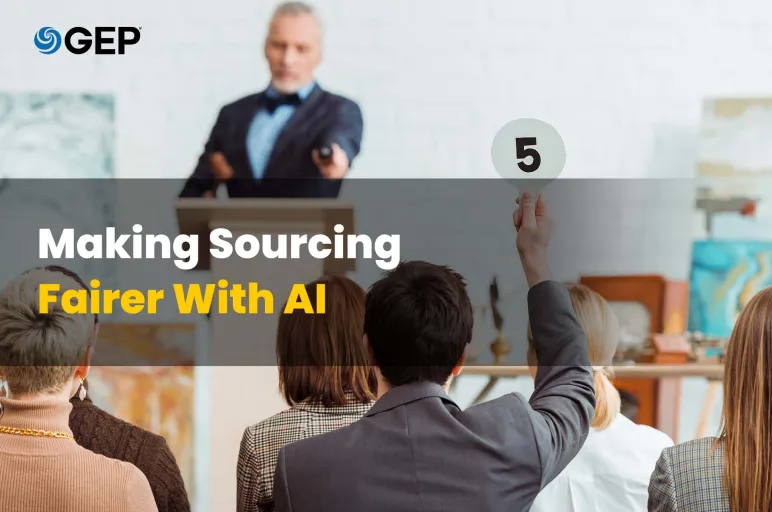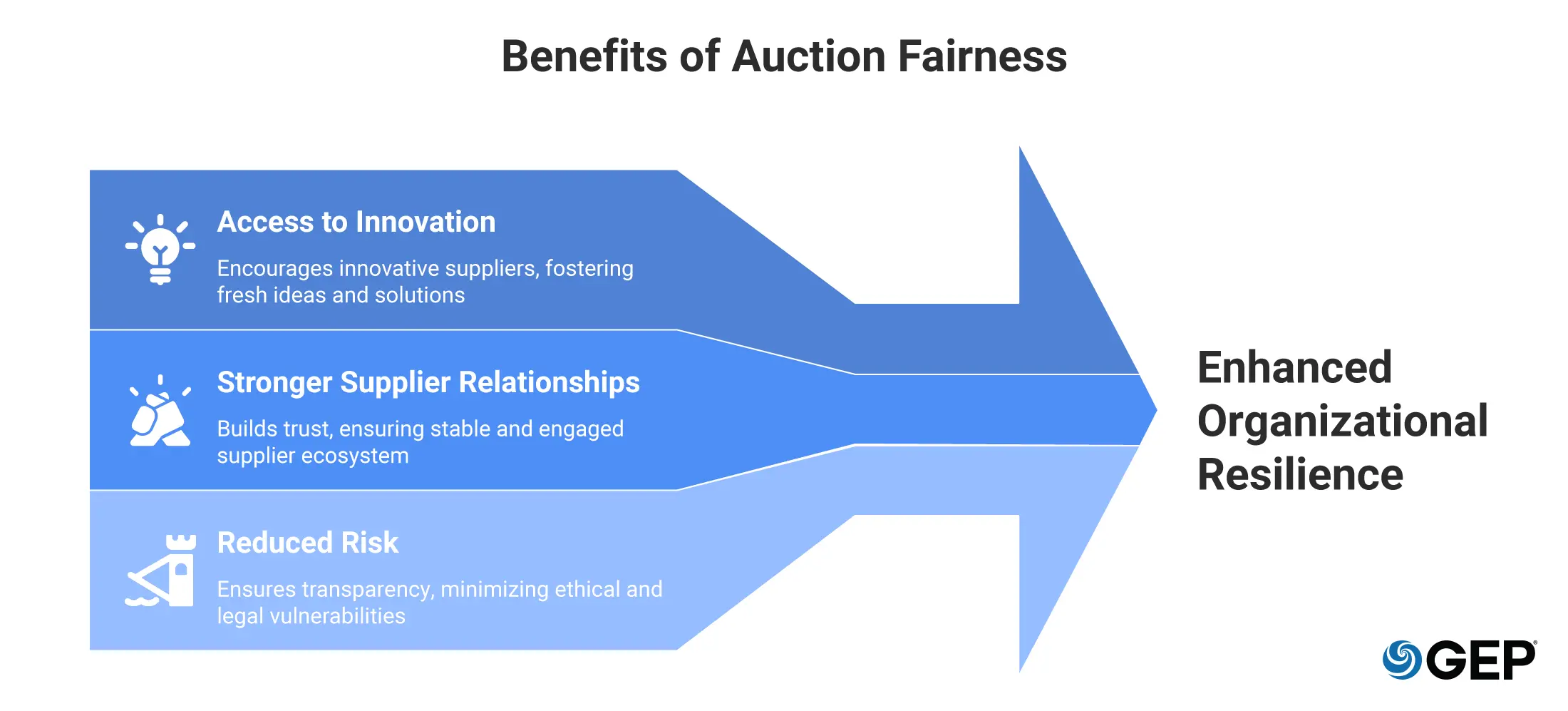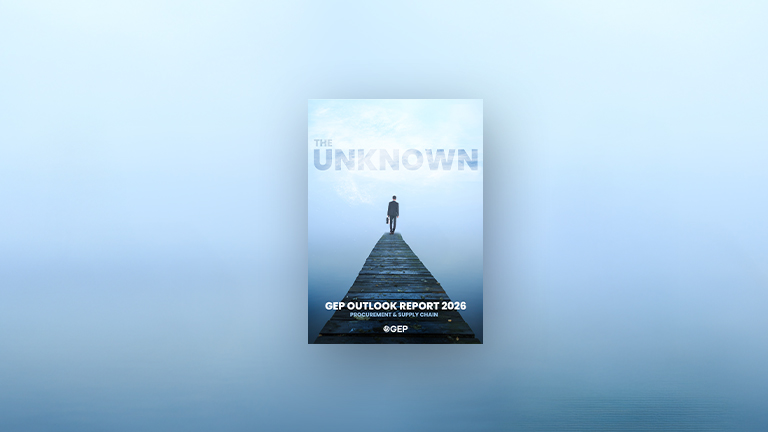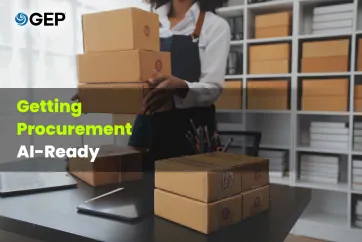
All’s Fair in Love and Auctions: Why Auction Fairness Is Foundational to Modern Sourcing
- Auction fairness isn’t a nice-to-have for procurement; it’s a strategic business advantage that unlocks greater value.
- Organizations can attract top-tier suppliers, mitigate risk and secure long-term innovation beyond cost reduction by building transparent and fair sourcing processes.
- AI can enable fair auctions by boosting transparency and efficiency and reshaping the role of the procurement professional.
November 11, 2025 | Sourcing Technology 5 minutes read
Procurement's job is no longer just to wring the lowest price out of suppliers. It's more strategic. It's risk management, staying agile and resilient to keep your business running, even through disruptions.
Part of a successful strategy is a clear, transparent and insightful approach to sourcing auctions. Fairness in auctions is at the forefront of creating real value, sparking innovation and building resilient supply chains.
A fair auction is the notion that all suppliers have an equal opportunity to compete. That means all participants must be subject to the same rules, the same criteria of assessment and the same transparency of the procedure.
If potential suppliers find the sourcing events to be fair, it builds trust and encourages a greater and more diverse number of potential bidders to participate. It creates genuine competition and, more importantly, allows you to deliver favorable outcomes for your firm.
Essential Elements of Auction Fairness
Auction fairness in procurement sourcing is built on three essential pillars: transparency, equal opportunity and clear rules. These elements create a level playing field that benefits both the buying organization and its suppliers.
Transparency
For suppliers, transparency isn’t a buzzword. It means knowing exactly what criteria they’re being judged on, from the first RFP to the final award. They need a clear understanding of evaluation criteria, bidding procedures and real-time feedback (without revealing competitors’ identities). When the process is transparent, it engenders trust and makes the final outcome defensible.
Equal Opportunity
This ensures that all qualified suppliers can win. It prohibits discrimination and favoritism, ensuring that the decision is based solely on the merits of the bid. This helps attract a more diverse and competitive supplier base.
Clear Rules
The terms and conditions of the auction must be well-defined, consistently applied, and communicated to all participants upfront. When rules are unambiguous, they prevent disputes and ensure that the integrity of the process remains intact.
Unlocking Value Through Auction Fairness
Fairness isn’t just a soft metric that gets in the way of efficiency or cost savings. When you establish a fair process, you create an environment where suppliers compete based on their merits, not their connections or historical relationships.
This strategic link can have a significant impact on your bottom line. According to a World Bank study on its digital system in Bangladesh, the move to a fully electronic system, which enforced transparency and an equal playing field, resulted in a 7% savings in procurement costs and a reduction in procurement lead times from 100 days to just 53.
These impressive numbers were a direct result of increased competition driven by fairness. When every qualified bidder feels they have a genuine chance to win, they are motivated to put forward their best possible offers.

Beyond cost, though, fairness leads to better outcomes in other critical areas:
• Access to Innovation
Open and unbiased sourcing processes encourage smaller, more innovative suppliers to participate, bringing fresh ideas and cutting-edge solutions to your organization.
• Stronger Supplier Relationships
A fair process supports mutual trust between parties. When a supplier loses a bid but feels they were treated fairly, they are more likely to stay engaged and participate in future auctions. This fosters a healthier, more stable supply chain ecosystem.
• Reduced Risk
A transparent and well-documented sourcing process is more auditable and less susceptible to ethical or legal challenges, protecting your organization from reputational and financial risks.
AI as an Enabler of Auction Fairness
AI is helping procurement professionals execute with greater speed and accuracy. It acts as an impartial engine that can execute complex rules and analyze data without human bias.
Here's how AI helps to ensure fairness in procurement auctions:
• Objectivity Over Bias
Algorithms don’t have favorite suppliers or personal relationships. AI-powered sourcing tools can evaluate bids based on predefined, objective criteria that procurement teams establish, ensuring every single offer, from the smallest startup to the largest multinational, is assessed on its own merits.
AI is moving beyond simple data analysis to act as an "autonomous agent" that can handle the initial, time-intensive parts of sourcing. It will still be crucial for humans to stay in the loop to make decisions based on AI-suggested actions, but AI can provide the raw power to crunch the numbers and analyze bids.
• Radical Transparency
With AI-powered platforms, suppliers no longer wait in the dark. Real-time updates show them exactly where they stand in the auction, giving them a clearer sense of how their offer compares to the competition. Transparency in auction processes leads to better and more competitive bidding on the one hand, but also better supplier relationships.
• Proactive Optimization With Predictive Analytics
Rather than reacting to issues after they occur, AI-powered auction tools can analyze historical bidding data to identify patterns and predict vulnerabilities in a future auction's design.
How so? Well, for instance, AI might identify certain bid increments that discourage competition or flag an unusual number of last-minute bids from a particular group of suppliers, which might indicate a coordinated effort to manipulate the outcome.
Discover More: Real-Time Sourcing Auctions
Architecture of Auction Fairness
Making auction processes fairer and more intelligent requires procurement teams to redefine their roles, from managing a series of manual tasks to becoming the architect of the sourcing process itself.
1. Define Your Strategy First
Begin by clearly outlining your strategic objectives. An AI-enabled system can be configured to weigh these factors precisely and without bias, but you must define the criteria first.
2. Select the Right Partner
Look for a technology partner whose platform prioritizes transparency, auditability and ease of use.
3. Communicate with Suppliers
Be transparent about your new process. Explain the why behind the new approach and how it encourages suppliers to provide their best offers.
Gain Competitive Advantage
By taking these steps, procurement can shift from reactive to a proactive mode and design and orchestrate an efficient and fair system. The AI handles the data, the analytics and the impartial execution of the rules, while the sourcing team sets the rules, manages relationships and executes strategic vision.
The data is clear: transparent, technology-enabled auctions deliver superior sourcing results. Auction fairness provides a competitive advantage in modern procurement.



